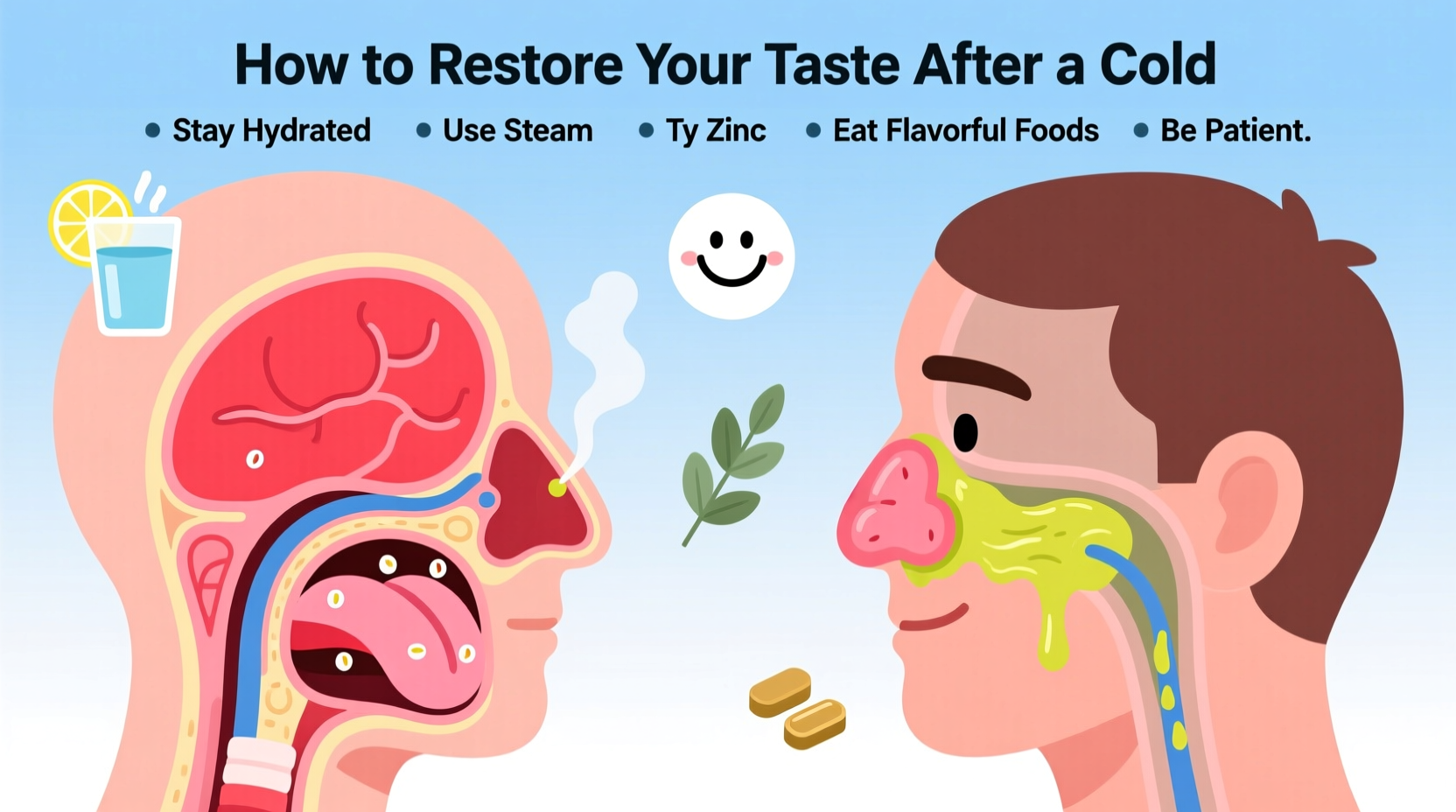If you've lost your sense of taste during a cold, you'll typically regain it within 1-2 weeks after your other symptoms improve. The most effective immediate actions include staying hydrated, using saline nasal irrigation, and practicing smell training with strong essential oils like lemon or rose. Avoid zinc supplements which can cause permanent taste damage, and focus on clearing nasal congestion to restore your ability to perceive flavors.
When a cold strikes, one of the most frustrating symptoms is losing your sense of taste. You're not alone—up to 70% of people experience temporary taste disturbances during upper respiratory infections. The good news is this usually resolves on its own, but certain evidence-based strategies can accelerate your recovery and make meals more enjoyable while you heal.
Why Colds Steal Your Sense of Taste (And Smell)
Your sense of taste relies heavily on your olfactory system. When nasal congestion from a cold blocks odor molecules from reaching your smell receptors, food suddenly seems bland. This condition, called hyposmia, affects approximately 60-80% of cold sufferers according to Mayo Clinic research. The good news is that unlike some viral infections, cold-related taste loss rarely causes permanent damage.

Your Taste Recovery Timeline: What to Expect
Understanding the natural progression helps manage expectations. Most people follow this pattern:
| Recovery Stage | Timeline | What You'll Notice |
|---|---|---|
| Acute phase | Days 1-5 of cold | Complete or near-complete taste/smell loss, especially for complex flavors |
| Early recovery | Days 6-10 | Basic tastes return (sweet, salty, sour), but subtle flavors remain muted |
| Full recovery | Days 11-14 | Nearly complete restoration of flavor perception in 95% of cases |
| Prolonged cases | 3+ weeks | Consult doctor if no improvement after 2 weeks post-cold |
Immediate Actions: First 48 Hours
When congestion hits, act quickly to minimize taste disruption:
Nasal Clearance Protocol
Clearing your nasal passages is the single most effective step for restoring taste. Implement this evidence-based routine:
- Saline irrigation: Use a neti pot with distilled water twice daily (per NCCIH guidelines)
- Steam therapy: Inhale steam with 2-3 drops of eucalyptus oil for 5 minutes, 3x daily
- Positioning: Sleep with head elevated 30-45 degrees to reduce nighttime congestion
Flavor Maximization Techniques
While waiting for your sense of smell to return, enhance basic taste perception:
- Focus on temperature contrasts (serve foods slightly warmer or cooler than usual)
- Incorporate textural variety (crunchy toppings on soft foods)
- Use stronger concentrations of basic tastes (slightly saltier broths, sweeter fruits)
Days 3-7: Accelerating Recovery
As your cold symptoms begin improving, implement these scientifically supported methods:
Smell Training Protocol
Research published in Rhinology Journal shows that structured smell training significantly accelerates olfactory recovery. Follow this method:
- Choose four strong, distinct scents: lemon (citrus), rose (floral), clove (spicy), eucalyptus (medicinal)
- Sniff each scent for 20 seconds, twice daily
- Concentrate on remembering what the scent smelled like before your cold
- Continue for minimum 12 weeks if recovery is slow
Nutritional Support
While zinc supplements can cause permanent taste damage, these nutrients support natural recovery:
- Vitamin A: Carrots, sweet potatoes (supports mucous membrane health)
- Vitamin C: Citrus fruits, bell peppers (reduces inflammation)
- Zinc-rich foods: Pumpkin seeds, lentils (avoid supplements)
Critical Context: When Home Remedies Aren't Enough
While most cases resolve naturally, certain situations require medical attention. These context boundaries determine when to seek help:
- Duration: No improvement 14 days after other cold symptoms resolve
- Symptom combination: Taste loss with facial pain or colored nasal discharge (possible sinus infection)
- Sudden onset: Complete taste loss without other cold symptoms (requires neurological evaluation)
The American Academy of Otolaryngology emphasizes that persistent taste disturbances beyond 2 weeks warrant professional evaluation to rule out complications like sinusitis or neurological issues.
Preventing Future Taste Disruptions
Reduce the severity and duration of future episodes with these proactive measures:
- Start saline irrigation at first sign of congestion (don't wait for full symptoms)
- Maintain optimal hydration year-round (aim for urine that's pale yellow)
- Use humidifier during cold season (40-60% humidity prevents mucous membrane drying)
- Practice good hand hygiene to reduce cold frequency
What Not to Do: Common Mistakes
Avoid these counterproductive approaches that can prolong recovery:
- Zinc nasal sprays: Linked to permanent smell loss according to FDA warnings
- Overusing decongestant sprays: Causes rebound congestion after 3 days
- Excessive salt rinses: Can irritate already sensitive nasal passages
- Ignoring hydration: Dry mucous membranes heal slower
Practical Meal Strategies During Recovery
Make eating enjoyable while your senses heal:
- Day 1-3: Focus on temperature and texture (chilled fruit smoothies, warm broths)
- Day 4-7: Introduce stronger basic tastes (citrus-marinated proteins, herb-infused oils)
- Week 2: Gradually reintroduce complex flavors as sensitivity returns
Professional chefs often use umami boosters during recovery periods—try adding nutritional yeast to dishes for savory depth that registers even with diminished taste perception.
Frequently Asked Questions
How long does taste loss typically last after a cold?
Most people regain normal taste perception within 7-14 days after other cold symptoms improve. Approximately 95% of cases resolve completely within 2 weeks. If taste hasn't improved after 14 days post-cold, consult an ENT specialist to rule out complications like sinusitis.
Can I speed up taste recovery with supplements?
Avoid zinc supplements which can cause permanent taste damage. Instead, focus on food sources of vitamin A (carrots, sweet potatoes) and vitamin C (citrus, bell peppers). The FDA has issued warnings about zinc nasal sprays causing permanent smell loss, so stick to evidence-based methods like saline irrigation and smell training.
Why does coffee taste different when I have a cold?
Coffee's complex flavor profile relies heavily on aroma. When nasal congestion blocks odor molecules, you primarily perceive only the basic bitter taste. This is why coffee (and many foods) seems one-dimensional during a cold. As your nasal passages clear, the full aromatic experience gradually returns.
Should I be concerned if I can't taste anything after a cold?
Temporary taste loss during a cold is normal and rarely indicates serious problems. However, if you experience complete taste loss without other cold symptoms, or if taste hasn't improved 14 days after your cold resolves, consult an ear, nose, and throat specialist. Persistent issues could indicate sinus infection or other conditions requiring treatment.
What's the difference between losing taste versus losing smell during a cold?
True taste loss (gustatory dysfunction) is rare during colds. What most people experience is actually smell loss (olfactory dysfunction), which dramatically reduces flavor perception since 80% of what we call 'taste' comes from smell. You'll usually still detect basic tastes (sweet, salty, sour, bitter, umami) but miss complex flavor nuances.











 浙公网安备
33010002000092号
浙公网安备
33010002000092号 浙B2-20120091-4
浙B2-20120091-4